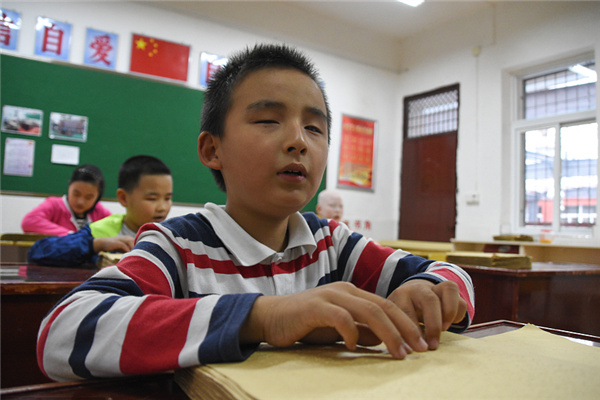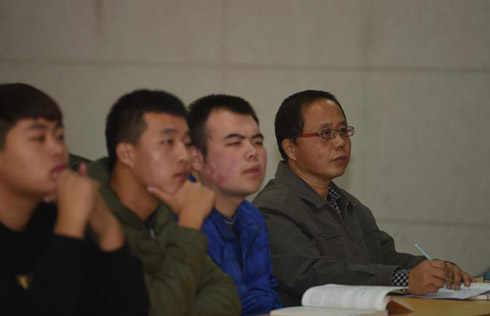Inclusive education faces headwinds
 |
|
A visually-impaired student on a class at a special education school in Anqing, East China's Anhui province. [Photo/VCG] |
The government's plan for inclusive education aims to have 95 percent of children with disabilities enrolled in mainstream schools by 2020. But the drive faces headwinds, including a lack of individual training plans and a teacher-evaluation system that doesn't adjust for lower student performance on average, which could hurt a teacher's chances of getting a pay raise.
Qiao Xueying would barely talk to her classmates when she first arrived as a transfer student at Wuhou Technology Park Primary School, an experimental school in Chengdu, Sichuan province.
"She was so introverted and felt so unsafe that she didn't play with other children," her teacher, He Ping, said. "She would scream when her grandfather dropped her off in the morning."
Qiao, who has trouble walking - a consequence of cerebral palsy - attended a special school until she was transferred in the second grade. In the three years that followed, her improvement has been noted.
He, a teacher involved in Wuhou's inclusive education program, said Qiao now happily plays and studies with other children, and there's even been some improvement to her physical condition thanks to exercise classes with specialist teachers.
Those able to go to regular schools should be encouraged to do so, according to Li Jing, a researcher at Renmin University of China who is focused on the rights and interests of people with disabilities.
"A totally inclusive education can help such children become more confident and gain interpersonal skills by communicating with others, which is extremely important for integrating into society," she said. "It can't be limited to studying at special schools with no contact with the outside world."
Zhu Yinuo is another example. The fifth-grader, who has Down syndrome, receives a tailored education at Wuhou, but she also takes some classes alongside other students.
"She is now more confident and open to playing with others compared with when she started," her father, Zhu Yin, said.
To aid the push toward inclusive education, the central government has pledged to give schools 6,000 yuan ($902) a year for each disabled student to cover the costs of upgrading facilities - such as toilets and stairwells - and paying specialist tutors, the Chinese Journal of Special Education reported in August.
One essential element, according to He, the schoolteacher, cannot be ignored: Most students with disabilities need individual training plans. But that "is seen as an extra burden for teachers at standard schools".
"Many disabled children also perform worse on exams than other students, which could mean trouble for teachers in terms of their own performance reviews," He said.
Du Yang, a senior communications officer at Save the Children, said that to ease the burden, educational departments and schools should set up special assessment systems for disabled students, and their test results should be excluded when evaluating teachers.
jiangchenglong@chinadaily.com.cn




























